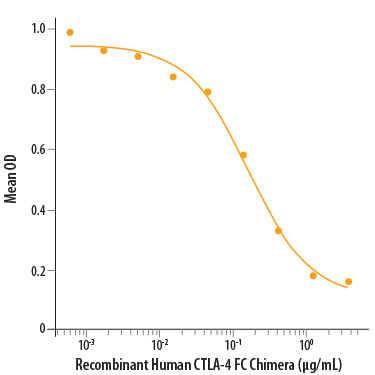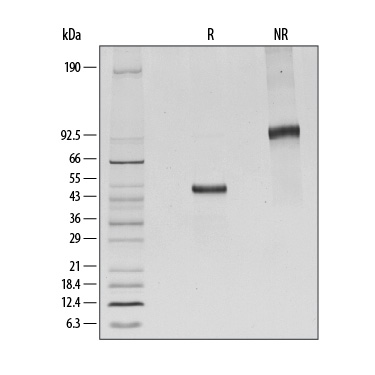Recombinant Human CTLA-4 Fc Chimera His-tag Protein Summary
Product Specifications
140-B1) in the presence of PHA.
| Human CTLA-4 (Ala37-Phe162) Accession # Q6GR94 |
IEGRMD | Human IgG1 (Pro100-Lys330) |
6-His tag |
| N-terminus | C-terminus | ||
Analysis
Product Datasheets
Carrier Free
CF stands for Carrier Free (CF). We typically add Bovine Serum Albumin (BSA) as a carrier protein to our recombinant proteins. Adding a carrier protein enhances protein stability, increases shelf-life, and allows the recombinant protein to be stored at a more dilute concentration. The carrier free version does not contain BSA.
In general, we advise purchasing the recombinant protein with BSA for use in cell or tissue culture, or as an ELISA standard. In contrast, the carrier free protein is recommended for applications, in which the presence of BSA could interfere.
325-CT
| Formulation | Lyophilized from a 0.2 μm filtered solution in PBS with BSA as a carrier protein. |
| Reconstitution | Reconstitute at 500 μg/mL in sterile PBS containing at least 0.1% human or bovine serum albumin. |
| Shipping | The product is shipped at ambient temperature. Upon receipt, store it immediately at the temperature recommended below. |
| Stability & Storage: | Use a manual defrost freezer and avoid repeated freeze-thaw cycles.
|
325-CT/CF
| Formulation | Lyophilized from a 0.2 μm filtered solution in PBS. |
| Reconstitution | Reconstitute at 200 μg/mL in sterile PBS. |
| Shipping | The product is shipped at ambient temperature. Upon receipt, store it immediately at the temperature recommended below. |
| Stability & Storage: | Use a manual defrost freezer and avoid repeated freeze-thaw cycles.
|
Scientific Data
 View Larger
View Larger
Recombinant Human CTLA-4 Fc Chimera (Catalog # 325-CT) inhibits IL-2 secretion by stimulated Jurkat human acute T cell leukemia cells. The ED50 for this effect is 0.1-0.4 µg/mL when stimulated with 1 µg/mL Recombinant Human B7-1 Fc Chimera (Catalog # 140-B1) in the presence of PHA.
 View Larger
View Larger
1 μg/lane of Recombinant Human CTLA-4 Fc Chimera was resolved with SDS-PAGE under reducing (R) and non-reducing (NR) conditions and visualized by silver staining, showing single bands at 51 kDa and 94 kDa, respectively.
Reconstitution Calculator
Background: CTLA-4
CTLA-4 (cytotoxic T-lymphocyte-4, designated CD152), is a type I transmembrane T cell inhibitory molecule that is a member of the Ig superfamily (1, 2). Human or mouse CTLA-4 cDNA encodes 223 amino acids (aa) including a 35 aa signal sequence, a 126 aa extracellular domain (ECD) with one Ig-like V-type domain, a 21 aa transmembrane (TM) sequence, and a 41 aa cytoplasmic sequence. It is found as a covalent homodimer of 41‑43 kDa (2). Within the ECD, human CTLA-4 shares 68%, 71% and 83‑86% aa sequence identity with mouse, rat and porcine/bovine/rabbit/feline/canine CTLA-4, respectively. A 174 aa form that lacks TM and cytoplasmic sequences (sCTLA-4) is possibly secreted (3‑5). Isoforms of 56‑79 aa that mainly contain parts of the cytoplasmic domain are reported. In mouse, an isoform lacking the Ig-like domain has ligand-independent inhibitory activity and is termed liCTLA-4 (6). CD28, which is structurally related to CTLA-4, is constitutively expressed on naïve T cells and promotes T cell activation when engaged by B7-2 on antigen-presenting cells (APC) within the immunological synapse (IS) (1, 7, 8). In contrast, CTLA-4 is recruited from intracellular vesicles to the IS beginning 1, 2 days after T cell activation (2, 7, 8). It forms a linear lattice with B7‑1 on APC, inducing negative regulatory signals and ending T cell activation (9). Abatacept, a therapeutic human CTLA-4-Ig fusion protein (trade name Orencia), competes with CD28 for B7-1 and B7-2 binding and has been used to antagonize T cell activation in autoimmune conditions and to enhance transplant survival (10). Mice deleted for CTLA-4 show no abnormalities until after birth, but then develop lethal autoimmune reactions due to continued T cell activation and poor control by regulatory T cells, which constitutively express CTLA-4 in wild-type mice and humans (11‑13).
- Harper, K. et al. (1991) J. Immunol. 147:1037.
- Teft, W.A. et al. (2006) Annu. Rev. Immunol. 24:65.
- Magistrelli, G. et al. (1999) Eur. J. Immunol. 29:3596.
- Tector, M. et al. (2009) BMC Immunol. 10:51.
- Oaks, M.K. and K.M. Hallett (2000) J. Immunol. 164:5015.
- Vijayakrishnan, L. et al. (2004) Immunity 20:563.
- Pentcheva-Hoang, T. et al. (2004) Immunity 21:401.
- Jansson, A. et al. (2005) J. Immunol 175:1575.
- Darlington, P.J. et al. (2005) J. Immunol. 175:996.
- Platt, A.M. et al. (2010) J. Immunol. 185:1558.
- Wing, K. et al. (2008) Science 322:271.
- Friedline, R.H. et al. (2009) J. Exp. Med. 206:421.
- Jain, N. et al. (2010) Proc. Natl. Acad. Sci. USA 107:1524.
Citations for Recombinant Human CTLA-4 Fc Chimera His-tag Protein
R&D Systems personnel manually curate a database that contains references using R&D Systems products. The data collected includes not only links to publications in PubMed, but also provides information about sample types, species, and experimental conditions.
7
Citations: Showing 1 - 7
Filter your results:
Filter by:
-
Idelalisib and caffeine reduce suppression of T cell responses mediated by activated chronic lymphocytic leukemia cells
Authors: BD Hock, SA MacPherson, JL McKenzie
PLoS ONE, 2017-03-03;12(3):e0172858.
Species: Human
Sample Types: Whole Cells
Applications: Bioassay -
Cell-extrinsic CTLA4-mediated regulation of dendritic cell maturation depends on STAT3.
Authors: Kowalczyk A, D'Souza C, Zhang L
Eur J Immunol, 2014-01-22;44(4):1143-55.
Species: Human
Sample Types: Whole Cells
Applications: Bioassay -
MHC class II transactivator CIITA is a recurrent gene fusion partner in lymphoid cancers.
Authors: Steidl C, Shah SP, Woolcock BW
Nature, 2011-03-02;471(7338):377-81.
Species: Human
Sample Types: Whole Cells
Applications: Bioassay -
Human gammadelta T lymphocytes induce robust NK cell-mediated antitumor cytotoxicity through CD137 engagement.
Authors: Maniar A, Zhang X, Lin W, Gastman BR, Pauza CD, Strome SE, Chapoval AI
Blood, 2010-06-02;116(10):1726-33.
Species: Human
Sample Types: Whole Cells
Applications: Bioassay -
Lung myeloid dendritic cells coordinately induce TH1 and TH17 responses in human emphysema.
Authors: Shan M, Cheng HF, Song LZ
Sci Transl Med, 2009-10-28;1(4):4ra10.
Species: Human
Sample Types: Whole Cells
Applications: Bioassay -
The soluble forms of CD28, CD86 and CTLA-4 constitute possible immunological markers in patients with abdominal aortic aneurysm.
Authors: Sakthivel P, Shively V, Kakoulidou M
J. Intern. Med., 2007-04-01;261(4):399-407.
Applications: ELISA (Standard) -
Chimeric co-stimulatory molecules that selectively act through CD28 or CTLA-4 on human T cells.
Authors: Lazetic S, Leong SR, Chang JC, Ong R, Dawes G, Punnonen J
J. Biol. Chem., 2002-08-06;277(41):38660-8.
Species: Human
Sample Types: Whole Cells
Applications: Flow Cytometry
FAQs
No product specific FAQs exist for this product, however you may
View all Proteins and Enzyme FAQsReviews for Recombinant Human CTLA-4 Fc Chimera His-tag Protein
Average Rating: 5 (Based on 4 Reviews)
Have you used Recombinant Human CTLA-4 Fc Chimera His-tag Protein?
Submit a review and receive an Amazon gift card.
$25/€18/£15/$25CAN/¥75 Yuan/¥2500 Yen for a review with an image
$10/€7/£6/$10 CAD/¥70 Yuan/¥1110 Yen for a review without an image
Filter by:
0.5 ug mCTLA-4-hIgG1 (Cat# 325-CT-200) was added to cells expressing mB7-1 GFP. Binding was detected with anti-human 594 secondary antibody.


